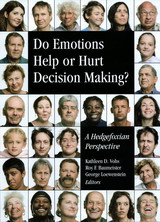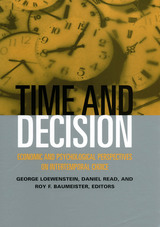2 books by Baumeister, Roy F.

Do Emotions Help or Hurt Decisionmaking?
A Hedgefoxian Perspective
Kathleen D. Vohs
Russell Sage Foundation, 2007
Philosophers have long tussled over whether moral judgments are the products of logical reasoning or simply emotional reactions. From Jane Austen's Sense and Sensibility to the debates of modern psychologists, the question of whether feeling or sober rationality is the better guide to decision making has been a source of controversy. In Do Emotions Help or Hurt Decision Making? Kathleen Vohs, Roy Baumeister, and George Loewenstein lead a group of prominent psychologists and economists in exploring the empirical evidence on how emotions shape judgments and choices. Researchers on emotion and cognition have staked out many extreme positions: viewing emotions as either the driving force behind cognition or its side effect, either an impediment to sound judgment or a guide to wise decisions. The contributors to Do Emotions Help or Hurt Decision Making? provide a richer perspective, exploring the circumstances that shape whether emotions play a harmful or helpful role in decisions. Roy Baumeister, C. Nathan DeWall, and Liqing Zhang show that while an individual's current emotional state can lead to hasty decisions and self-destructive behavior, anticipating future emotional outcomes can be a helpful guide to making sensible decisions. Eduardo Andrade and Joel Cohen find that a positive mood can negatively affect people's willingness to act altruistically. Happy people, when made aware of risks associated with altruistic acts, become wary of jeopardizing their own well-being. Benoît Monin, David Pizarro, and Jennifer Beer find that whether emotion or reason matters more in moral evaluation depends on the specific issue in question. Individual characteristics often mediate the effect of emotions on decisions. Catherine Rawn, Nicole Mead, Peter Kerkhof, and Kathleen Vohs find that whether an individual makes a decision based on emotion depends both on the type of decision in question and the individual's level of self-esteem. And Quinn Kennedy and Mara Mather show that the elderly are better able to regulate their emotions, having learned from experience to anticipate the emotional consequences of their behavior. Do Emotions Help or Hurt Decision Making? represents a significant advance toward a comprehensive theory of emotions and cognition that accounts for the nuances of the mental processes involved. This landmark book will be a stimulus to scholarly debates as well as an informative guide to everyday decisions.
[more]

Time and Decision
Economic and Psychological Perspectives of Intertemporal Choice
George Loewenstein
Russell Sage Foundation, 2003
How do people decide whether to sacrifice now for a future reward or to enjoy themselves in the present? Do the future gains of putting money in a pension fund outweigh going to Hawaii for New Year's Eve? Why does a person's self-discipline one day often give way to impulsive behavior the next? Time and Decision takes up these questions with a comprehensive collection of new research on intertemporal choice, examining how people face the problem of deciding over time. Economists approach intertemporal choice by means of a model in which people discount the value of future events at a constant rate. A vacation two years from now is worth less to most people than a vacation next week. Psychologists, on the other hand, have focused on the cognitive and emotional underpinnings of intertemporal choice. Time and Decision draws from both disciplinary approaches to provide a comprehensive picture of the various layers of choice involved. Shane Frederick, George Loewenstein, and Ted O'Donoghue introduce the volume with an overview of the research on time discounting and focus on how people actually discount the future compared to the standard economic model. Alex Kacelnik discusses the crucial role that the ability to delay gratification must have played in evolution. Walter Mischel and colleagues review classic research showing that four year olds who are able to delay gratification subsequently grow up to perform better in college than their counterparts who chose instant gratification. The book also delves into the neurobiology of patience, examining the brain structures involved in the ability to withstand an impulse. Turning to the issue of self-control, Klaus Wertenbroch examines the relationship between consumption and available resources, showing, for example, how a high credit limit can lead people to overspend. Ted O'Donoghue and Matthew Rabin show how people's awareness of their self-control problems affects their decision-making. The final section of the book examines intertemporal choice with regard to health, drug addiction, dieting, marketing, savings, and public policy. All of us make important decisions every day-many of which profoundly affect the quality of our lives. Time and Decision provides a fascinating look at the complex factors involved in how and why we make our choices, so many of them short-sighted, and helps us understand more precisely this crucial human frailty.
[more]
READERS
Browse our collection.
PUBLISHERS
See BiblioVault's publisher services.
STUDENT SERVICES
Files for college accessibility offices.
UChicago Accessibility Resources
home | accessibility | search | about | contact us
BiblioVault ® 2001 - 2024
The University of Chicago Press









